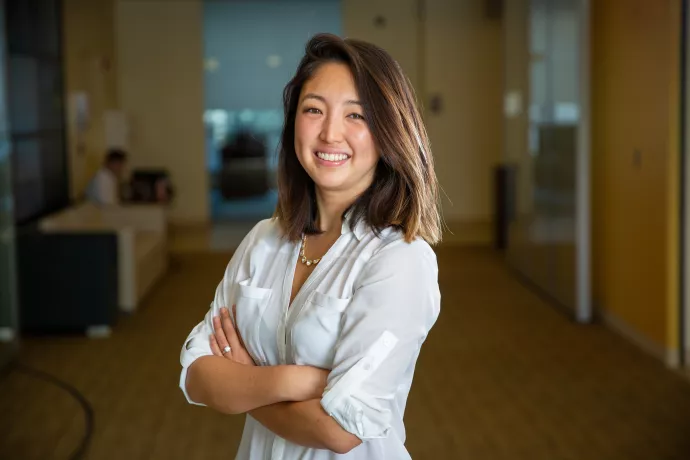
Chemical transformation
Alana Ogata didn’t always know precisely what direction her scholarly journey would lead, but it’s likely a willingness to weather some risks and her enthusiasm that has been steering her along the current path in academia.
“Somehow at every phase in my life, I didn’t really know what I wanted to do, but I knew what I was excited about,” says Ogata in a recent interview on VIEW to the U podcast.
Having joined the faculty in UTM’s Department of Chemical & Physical Sciences in July 2021, the assistant prof’s past aspirations have included entrepreneurship, industry, and government research, but she now has her sights set on her bioinspired nanomaterial research, improving disease diagnostics to revolutionize women’s healthcare, and serving as a mentor for the next generation of students and trainees.
Ogata’s lab covers a broad mix of bioanalytical chemistry to measure proteins in cells and blood. Since proteins are at the root of many biological functions and health conditions, quantifying them helps scientists better understand their relation to disease.
“For example, cells from a cancerous tumor secrete proteins themselves,” says Ogata.
“That is what we call a ‘protein biomarker,’ and if you are able to detect those proteins secreted into the blood, then it’s an indication that there's the presence of this cancerous tumor somewhere in the body. There are a lot of proteins that can serve as diagnostic biomarkers – that are present in the body because of some disease, cancer, or infection – and if you can find them, you can diagnose the disease with a simple blood sample.”
Ultimately, Ogata is working to solve crucial challenges in disease diagnostics, particularly for women, and primarily in regards to reproductive health and in gynecological conditions. She cites endometriosis, a painful disorder in which tissue grows outside the uterus instead of inside where it usually grows, as a particular example of a diagnostic process she would like to improve.
Aside from her work in the lab, the other area of focus for her is animating discussions around equity, diversity, and inclusion (EDI) with her students.
She assigns her students the task of bringing EDI-focused articles during lab meetings as a point of entry, and to foster conversations in her lab about these areas to make students more aware and keep the dialogue current. Ogata says that she herself has learned so much since implementing this practice and that the students have introduced an incredible range of articles that include inequity in undergraduate courses, initiating conversations in graduate students, and survival’s guilt.
The other area that is of utmost importance to Ogata is the mentoring of students.
She says she is grateful for the many mentors in her own history, from the researchers she encountered at all levels: from her formative time in her undergraduate days with Kristin Wustholz at William & Mary in the US, to her graduate work at the University of California, Irvine in the lab of Reg Penner, and her post-doctoral research fellowship at Harvard Medical School and Brigham and Women’s Hospital in Boston with David Walt.
“I have had really supportive, influential mentors that have catalyzed me to this point, and I've taken a little bit of research from each of them into my current interdisciplinary research Program and put my own twist on it,” says Ogata.
“I had a wonderful time growing through the academic system, and now I'm trying to return the favour by mentoring graduate and undergraduate students.”
Resources
- Learn more about Professor Ogata’s work from her website.
- Listen to the December 2021 episode of VIEW to the U where she talks about her research, her motivations for her work, and also some of the strategies for minimizing stress during stressful times.
